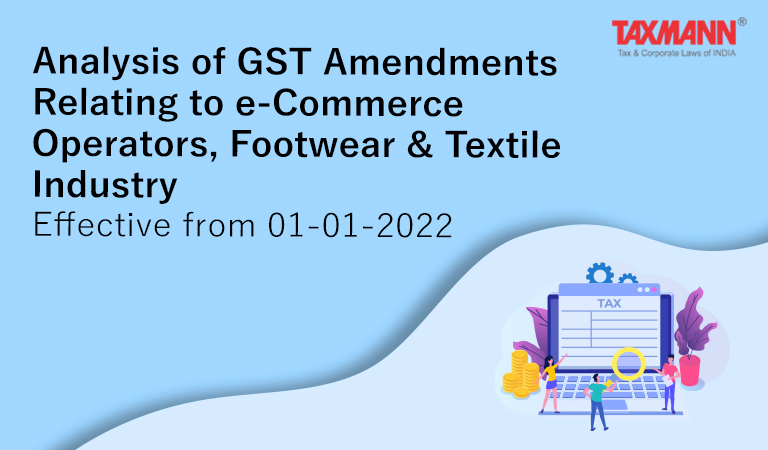Analysis of GST Amendments Relating to e-Commerce Operators, Footwear & Textile Industry | Effective from 01-01-2022
- Blog|Advisory|GST & Customs|
- 3 Min Read
- By Taxmann
- |
- Last Updated on 19 July, 2022

The Government has issued several notifications on November 18, 2021, to provide amendments relating to GST rates and widen the scope of taxability of E-commerce operators. These changes mainly relate to the Footwear sector, Textile sector, among others. These changes will be effective from January 01, 2022. These amendments relating to e-commerce operators and the footwear & textile industry are discussed as follows:
1. Changes in the scope of taxability of E-Commerce Operators – Food & Passenger Vehicle Aggregator
(Notification No. 16/2021-CT (Rate) & 17/2021-CT (Rate), Dated Nov 18, 2021)
1.1 GST levy on Motor Vehicle aggregators
The scope of taxability of the services of transportation of passengers through E-commerce Operators (‘ECO’) has been increased[1] to include ‘omnibus’ and ‘any other motor vehicle’. The notification levying GST on ECO has borrowed the meaning of the terms ‘omnibus’ and ‘motor vehicle’ from the Motor Vehicle Act, 1988.
In the context of the above services, the service exemption notification has also been amended to provide that no exemption would be available in respect of the below services supplied through an ECO:
| Sl. No. |
Description |
HSN |
Existing rate |
New Rate[2] |
| 1. | Transport of passengers, with or without accompanied belongings, by—
(Sl. No. 15 of Notification No. 12/2017-CT (Rate), Dated 28-06-2017) |
9964 | Exempted | 5% Or 12% (with ITC) if services supplied through an electronic commerce operator otherwise exempted |
| 2. | Service of transportation of passengers, with or without accompanied belongings, by—
(Sl. No. 17 of Notification No. 12/2017-CT (Rate), Dated 28-06-2017) |
9964 | Exempted | 5% Or 12% (with ITC) if services supplied through an electronic commerce operator otherwise exempted |
With the above amendment, the services of autos, e-rickshaws, etc., availed using aggregator would be subject to GST. The aggregator would be liable to pay GST in such cases.
1.2 GST levy on Food Delivery aggregators
(Notification No. 17/2021-CT (Rate), Dated Nov 18, 2021)
The ambit of levying GST on a supply made through E-commerce operators has been increased to include Food Delivery aggregators within its scope. It has been provided that GST on the supply of ‘restaurant service’ would be paid by the E-Commerce operator as if he is the supplier of such services.
The above levy is subject to an exception where such services are supplied by the restaurants, eating joints, etc., located at premises providing hotel accommodation service having declared tariff of any unit of accommodation above Rs. 7,500 per unit per day or equivalent
This paradigm shift of GST liability from restaurants to food aggregators was earlier expected to be only in respect of small restaurants (especially for unregistered suppliers). This was because aggregators in other industries (i.e. hotel and housekeeping aggregators) are made liable to pay GST when the actual suppliers are not registered in GST. However, the impugned amendment has covered almost all restaurants within its scope.
Also, the cost of ordering food online would not change due to this shift in liability on food aggregators except where orders are made from restaurants that were not registered under GST.
2. Changes in GST rates under Footwear & Textile Industry
(Notification No. 14/2021-CT (Rate), Dated Nov 18, 2021)
In view of the decision of the 45th GST Council meeting, the Government has made a few changes to the GST rates for the footwear and textile industry. The recommendation was to increase the GST rates so that anomalies relating to inverted duty structures could be removed. Apart from the above rate changes, the GST rate on supply by way of job work relating to dyeing or printing of the textile and textile products falling under Chapters 50 to 63 has also been increased from 5% to 12%
[1] Notification No. 17/2021-Central Tax (Rate), dated November 18, 2021 based on the recommendations of 45th GST Council Meeting
[2] With effect from January 1, 2022
Disclaimer: The content/information published on the website is only for general information of the user and shall not be construed as legal advice. While the Taxmann has exercised reasonable efforts to ensure the veracity of information/content published, Taxmann shall be under no liability in any manner whatsoever for incorrect information, if any.

Taxmann Publications has a dedicated in-house Research & Editorial Team. This team consists of a team of Chartered Accountants, Company Secretaries, and Lawyers. This team works under the guidance and supervision of editor-in-chief Mr Rakesh Bhargava.
The Research and Editorial Team is responsible for developing reliable and accurate content for the readers. The team follows the six-sigma approach to achieve the benchmark of zero error in its publications and research platforms. The team ensures that the following publication guidelines are thoroughly followed while developing the content:
- The statutory material is obtained only from the authorized and reliable sources
- All the latest developments in the judicial and legislative fields are covered
- Prepare the analytical write-ups on current, controversial, and important issues to help the readers to understand the concept and its implications
- Every content published by Taxmann is complete, accurate and lucid
- All evidence-based statements are supported with proper reference to Section, Circular No., Notification No. or citations
- The golden rules of grammar, style and consistency are thoroughly followed
- Font and size that’s easy to read and remain consistent across all imprint and digital publications are applied



 CA | CS | CMA
CA | CS | CMA
